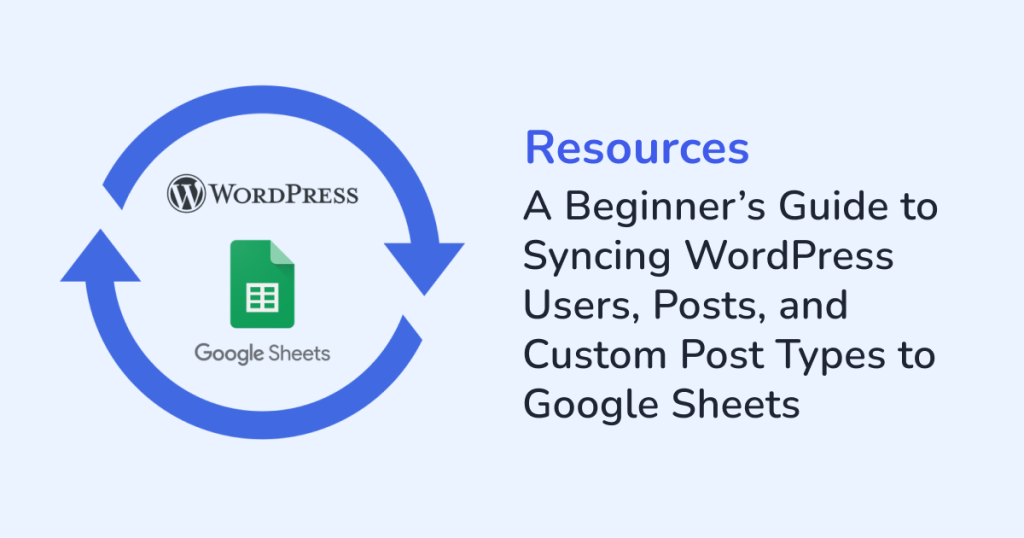
If you’re managing a growing WordPress website, you probably deal with a lot of data. The data includes user registrations, blog posts, and custom post types (like portfolios, testimonials, or job listings). And managing all of these efficiently is a tedious task. That’s where connecting WordPress to Google Sheets makes all the difference. It makes data handling:
- Simpler
- Organized
- Shareable
- Instantly visible in real-time
- Smooth for team collaboration
- Automated without any coding
In this guide, we’ll walk you through how to sync the following WordPress data to Google Sheets using the WPSyncSheets For Core plugin:
- Users
- Posts
- Custom post types
Why Sync WordPress to Google Sheets?
Centralized, Cloud-Based Access
No more sharing CSVs over email. Your data lives in one place, updated in real time, and accessible to your team from anywhere.
Live Collaboration
Your content managers, developers, and clients can view or edit Sheets together, just like a shared workspace.
Backup & Version History
Google Sheets keeps every edit in a versioned history. It’s perfect for tracking changes or recovering lost data.
Automation Ready
For automated workflows and reporting, you can connect to tools like Zapier and Google Data Studio, use:
- Filters
- Formulas
- Conditional formatting
With all the features, this integration can save hours every week for site owners, marketers, or freelancers managing client sites.
What Data You Can Sync Using WPSyncSheets For Core?
The WPSyncSheets For Core plugin lets you automatically send WordPress data to Google Sheets—no custom code or APIs needed. So, whether you manage a WooCommerce store or membership site, this plugin makes it incredibly easy to keep your content and user data organized in Sheets. With this plugin, you can sync:
- User data such as name, email address, and more.
- Post data including titles, content, categories, tags, status, author info, etc.
- Pages which are great for managing content audits, SEO reporting, or editorial workflows.
- Custom post types including:
- Portfolios
- Events
- Job listings
- Testimonials
- Other post types created by themes or plugins
Common Use Cases
Freelancers & Agencies
- Track user signups across multiple sites.
- Export content lists for client approval.
- Monitor post performance and publication status.
Store Owners & Membership Sites
- Maintain a real-time user directory.
- Track customer registrations and status.
- Create custom dashboards for product posts or reviews.
Teachers & Community Organizations
- Log volunteer signups or student accounts.
- Keep a live calendar or spreadsheet of events or blog posts.
- Share content schedules with teams easily
Step-by-Step: Syncing WordPress Data to Google Sheets
Step 1: Install the Plugin
First, install WPSyncSheets For Core from your WordPress dashboard. Activate it like any other plugin.
Step 2: Connect to Google Sheets
Use secure OAuth authentication to link your Google Account and ensure the plugin can send data safely to your Sheets.
Step 3: Choose the Data Type to Sync
From the plugin settings, select the WordPress data type you want to sync:
- Users
- Posts
- Pages
- Any registered Custom Post Type
Each data type can be connected to a different Google Sheet or all combined in a master sheet.
Step 4: Map Fields
Use the drag-and-drop field mapping interface to match WordPress fields to your sheet columns.
Step 5: Start Syncing
Once configured, new entries will sync automatically. You can also bulk-sync historical data with a few clicks. No cron jobs, no scripts, no code.
Features That Make WPSyncSheets Stand Out
Real-Time Sync
Every time a new user registers or a post is published, the data appears instantly in your connected Google Sheet.
Historical Sync
Want to export old blog posts or user data? WPSyncSheets lets you do it instantly—helpful for audits, migrations, or backup.
Supports All Post Types
It doesn’t stop at posts and pages. The plugin supports all registered CPTs from your themes or plugins.
Custom Field Support
Need to sync custom fields (ACF, Meta Box, etc.)? No problem. WPSyncSheets supports syncing meta fields too.
Plugin Compatibility
WPSyncSheets integrates seamlessly with popular plugins including WooCommerce, LearnDash, and Easy Digital Downloads. So, you can sync products, courses, or custom modules as well.
Sample Use Cases in Action
Content Audit Report
Export a list of all published posts with their SEO titles, authors, last updated dates, and status. Share this sheet with your content team to identify outdated or underperforming articles.
User Onboarding Tracker
Track new user registrations in real time. Filter by role (subscriber, contributor, customer), add notes or onboarding status, and automate welcome emails via Zapier.
Editorial Calendar
Use the plugin to sync blog post drafts. Then, build a calendar view in Sheets to track publish dates, authors, and progress stages.
Form to Sheet Logging
If your CPTs are submitted through frontend forms (e.g., job listings), use WPSyncSheets to capture each submission in a Google Sheet for approval workflows.
Benefits for Different Roles
| Role | How WPSyncSheets Helps |
| Marketers | Track content performance and prepare reports. |
| Admins | Monitor site activity and user registrations. |
| Clients | Real-time access to relevant content without dashboard access. |
| Developers | Reduce dependency for custom APIs or time-consuming manual exports. |
Make Your Sync Work Smarter, Not Harder
Once synced, you can do the following :
- Use filters to sort data based on category, status, or author.
- Color-code rows to flag drafts, expired posts, or new users.
- For advanced reporting, connect to Google Data Studio.
- Automate tasks using Google Apps Script or Zapier.
Final Thoughts
Syncing WordPress data to Google Sheets creates a massive impact. With WPSyncSheets For Core, you eliminate repetitive tasks, reduce errors, and create a shared source of truth for your content and users.
Whether you’re a solo blogger, an agency managing 10+ sites, or a business running a WooCommerce store, this plugin lets you:
- Stay organized
- Collaborate better
- Build smarter workflows
- Save time and scale faster
So, stop manually exporting data and start syncing smarter today.
FAQs
Q1: Does WPSyncSheets support custom post types?
Yes, the plugin supports all registered post types in your WordPress install. This includes custom ones created by plugins or themes.
Q2: Can I sync old data as well?
Yes, you can bulk-sync existing data to your sheet with just a click.
Q3: Do I need coding skills to set this up?
No, the plugin is beginner-friendly and no-code configuration is required.
Q4: Is it safe to store user data in Google Sheets?
Yes, it is safe because WPSyncSheets connects via secure OAuth authentication and it offers both version history and secure backups.
Q5: Can I link multiple forms or post types to different sheets?
Yes, you can create multiple mappings to separate sheets or consolidate everything into a single master sheet—whichever fits your workflow.







